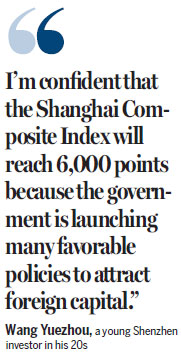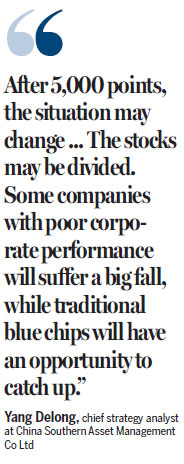The 'wild bulls' on a market rampage
Updated: 2015-06-16 07:03
By Chai Hua in Shenzhen(HK Edition)
|
|||||||
|
Equity markets on the mainland have been having a roller-coaster ride since the end of last year. While some investors have turned increasingly "opportunistic", others are still haunted by the nightmare of the 2007 stock crash, worried that another collapse could cast a prolonged shadow over the mainland's stock markets in the next few decades. Kevin Lee / Bloomberg |
A 32-year-old man, surnamed Hou, took his own life by jumping to his death in Changsha, Hunan province, on June 10 after losing 1.7 million yuan ($273,765) in a bet on China Railway Rolling Stock Corp Ltd (CRRC).
The CRRC - from the merger of China North Railway and China South Railway - made its debut on June 8 and rose by 10 percent to 32.4 yuan on the first day of trading.

The soaring stock market drove Hou to sensational heights - he used 1.7 million yuan to borrow 6.8 million yuan and dumped every cent into the CRRC stock. It was fate. In the following two days, the stock crashed to 26.5 yuan apiece.
The steep fall in the merged giant train maker didn't halt the bullish mainland bourses. Two days after Hou's death, the Shanghai Composite Index (SCI) soared to 5,178 points - a seven-year high.
Hou may be an extreme example, but the bull market has indeed made many investors lose their minds. Industry experts have kept reminding investors not to chase after stocks blindly at a high price, and must lower their profit expectations.
"I feel that the recent bull market has gone crazy," said Xie Kangjian, a 29-year-old male with five years of stock investment experience. He has doubled his investment of 100,000 yuan in two years and bought his first car earlier this year.
"However, I will not put any more money into stocks," said Xie, "because I'm not sure how far it will go after 5,000 points. I'm afraid many people will get trapped in the market for another 10 years if they don't pull back now."
Bu Decai, a young man working for a State-owned company who has just started investing in stocks this year, shared the same concern: "The risks are piling up after the 5,000-point level, so I'll better not invest that much like before."
He put 150,000 yuan into the market this year and has so far earned about 50,000 yuan.
Despite the wild market swings, most investors are hopeful of the mainland stock markets' future. According to a survey by Guangdong province-based Nandu Daily, more than 60 percent of Shenzhen residents are confident that the bull run will continue.
"I'm confident that the Shanghai Composite Index will reach 6,000 points because the government is launching many favorable policies to attract foreign capital," said Wang Yuezhou, a young Shenzhen investor in his 20s.
He opened a stocks account with 20,000 yuan earlier this year when he heard that his relatives are making money in the market, and has doubled the amount since.

Wang's explanation for his investment is that he's merely "playing". He doesn't know how to read the candlestick chart or any other technique analysis. "But I study government policies that are closely related to the stocks of industries with good potential."
The mainland markets have attracted more than 7.9 million new investors in the first quarter of this year - up by 433 percent compared with the same period last year - according to China Securities Depository and Clearing Corp Ltd.
Most of the new investors adopt an "opportunistic" attitude. Some have hit the jackpot by picking stocks because they liked the company's name.
Bu said he relied mainly on friends' suggestions in making stock investments: "I don't choose a stock according to its real value because the value of many stocks even with poor company performance, had doubled or even tripled in a blink these days."
Yang Delong, chief strategy analyst at China Southern Asset Management Co Ltd, admitted that some investors can earn money even with their eyes closed in the past few months.
Some 70 percent of Shenzhen investors have benefited from the bull market in the past three months, and about a third have earned about 100,000 yuan, according to a Nandu Daily poll.
However, after 5,000 points, the situation may change, Yang stressed.
"The stocks may be divided. Some companies with poor corporate performance will suffer a big fall, while traditional blue chips will have an opportunity to catch up."
Ren Zeping, a chief analyst at Guotai Junan Securities Co, warned that a medium-to-long-term bottom line is on the horizon in the second half of this year.
However, he thought that "the bull market will not cease as long as Beijing pushes ahead with reforms".
Ren had predicted last year that the SCI would hit 5,000 points, and his forecast now is 6,000.
He suggested that investors should turn their long-term investment to value stocks.
But, as Bu said, many new investors don't believe in the real value of a stock. Instead, they rely on "tips" or recommendations from securities analysts or friends. Such an investment mentality will be dangerous in the second half of this year.
Xie Kangjian, who's an experienced investor, said: "We should carefully research a company's performance and its growth potential before choosing a stock. If one doesn't have the time or patience, he should just buy index funds."
grace@chinadailyhk.com
|
The mainland stock markets have attracted more than 7.9 million new investors in the first quarter of this year - up by 433 percent compared with the same period last year - according to China Securities Depository and Clearing Corp Ltd. Kevin Lee / Bloomberg |
(HK Edition 06/16/2015 page1)

